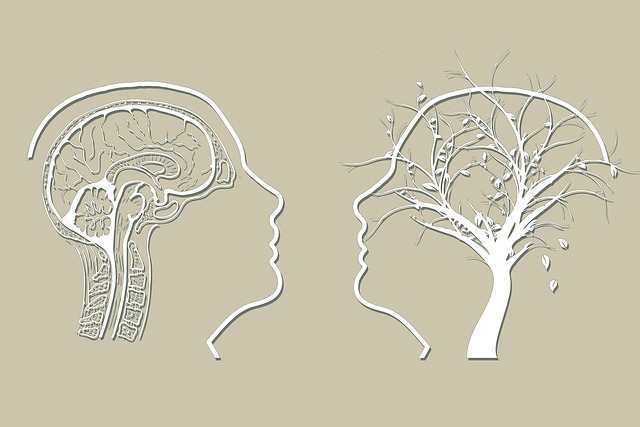Emotional intelligence (EI), enhanced by Englewood Anxiety Therapy, is a powerful tool for managing emotions and interacting with others effectively. Through mental wellness coaching and coping skill development, individuals gain confidence, stress management, better decision-making, and improved communication. This leads to personal growth, stronger relationships, and professional advancement. Techniques like active listening, empathy, mindfulness, and constructive feedback, taught by Englewood Anxiety Therapy, foster emotional regulation, prevent depression, and enhance overall well-being in both personal and professional settings. Organizations like Stress Management Workshops Organization further support these skills for better collaboration and satisfaction.
Emotional intelligence (EI) is a game-changer in both personal and professional spheres. This article guides you through the process of building EI, offering practical strategies inspired by Englewood Anxiety Therapy. We’ll explore key areas such as understanding and managing your emotions, empathizing with others, improving communication skills, and enhancing self-awareness for profound personal growth. By the end, you’ll be equipped to navigate relationships and challenges with increased emotional intelligence.
- Understanding Emotional Intelligence and Its Benefits
- Recognizing and Managing Your Emotions
- Empathizing with Others: The Art of Active Listening
- Improving Communication Skills for Effective Relationships
- Strategies to Enhance Self-Awareness and Personal Growth
Understanding Emotional Intelligence and Its Benefits

Emotional intelligence (EI) is a powerful tool that equips individuals with the ability to recognize and manage their emotions effectively. It involves understanding one’s own feelings, as well as recognizing, interpreting, and responding appropriately to the emotions of others. This concept has gained significant traction in recent years due to its profound impact on various aspects of life. From personal relationships to professional success, EI acts as a catalyst for positive change.
Englewood Anxiety Therapy highlights the immense benefits of fostering emotional intelligence. By participating in mental wellness coaching programs and developing coping skills, individuals can boost their confidence and overall mental health. These strategies enable people to navigate challenging situations with poise, improve communication, and build stronger connections. The development of EI not only helps in stress management but also facilitates better decision-making and conflict resolution, making it a valuable asset for personal growth and professional advancement.
Recognizing and Managing Your Emotions

Recognizing and managing your emotions is a crucial component of developing emotional intelligence. This involves understanding your feelings, both positive and negative, and learning to express them in healthy ways. It’s about recognizing when you’re experiencing strong emotions like anxiety or anger, rather than ignoring or suppressing them. Engaging in Englewood Anxiety Therapy can help individuals identify triggers, develop coping skills for managing these intense feelings, and ultimately prevent depression by fostering better emotional regulation.
By learning to recognize your emotions, you gain valuable insights into your inner world. This self-awareness enables you to make sense of your reactions and respond thoughtfully rather than reacting impulsively. As emotional intelligence grows, so does your ability to navigate complex social situations with grace and empathy, further enhancing your relationships and overall well-being.
Empathizing with Others: The Art of Active Listening

Empathizing with others is a cornerstone of emotional intelligence and a key skill taught by Englewood Anxiety Therapy. Active listening, a practice rooted in compassion cultivation, involves fully concentrating on what someone else is saying, understanding their perspective, and responding thoughtfully. It goes beyond simply hearing words; it requires engaging all senses to grasp the full depth of their emotions.
By incorporating compassion cultivation practices into everyday interactions, individuals can enhance their ability to connect with others. This not only fosters deeper relationships but also contributes to a more positive social environment. For mental health professionals, mastering these skills is crucial for effective risk assessment and delivery of care. Social skills training further refines this art, enabling practitioners to navigate complex interpersonal dynamics with ease and sensitivity.
Improving Communication Skills for Effective Relationships

Effective communication is a cornerstone of emotional intelligence and building strong relationships. It involves not just what you say but how you convey it—a skill often honed through therapy, like that offered by Englewood Anxiety Therapy. By learning to recognize and manage emotions, individuals can express themselves more clearly, reducing misunderstandings and conflicts. This is crucial in personal and professional settings, fostering an environment of trust and respect.
The ability to listen actively, empathize, and provide constructive feedback are key aspects of improving communication skills. Organizations like Stress Management Workshops Organization focus on teaching these techniques as part of their Emotional Well-being Promotion Techniques. These workshops empower individuals to navigate relationships more effectively, leading to improved collaboration and satisfaction in both personal and work life.
Strategies to Enhance Self-Awareness and Personal Growth

Building emotional intelligence involves a journey of self-discovery and growth. One powerful tool in this process is mindfulness, which encourages individuals to focus on the present moment, observe their thoughts and emotions without judgment, and develop a deeper understanding of themselves. Practices like meditation and mindful breathing can help regulate feelings, reduce stress, and enhance overall well-being. Through these practices, one can cultivate a more accurate perception of their internal state, enabling better decision-making and improved relationships.
Englewood Anxiety Therapy emphasizes the importance of self-awareness in fostering personal growth. By understanding one’s triggers, emotional responses, and thought patterns, individuals can challenge negative beliefs and develop healthier coping mechanisms. The Mind Over Matter principles guide people to reframe their perspectives, cultivating resilience and a more positive outlook. Moreover, healthcare providers can benefit from burnout prevention strategies that incorporate self-care practices, setting boundaries, and prioritizing mental health alongside their demanding professions.
Emotional intelligence is a powerful tool for personal growth and building meaningful connections. By understanding and managing your emotions, practicing active listening, and honing communication skills, you can create more fulfilling relationships and lead a happier life. The strategies outlined in this article, such as those offered by Englewood Anxiety Therapy, provide practical ways to enhance self-awareness and navigate social interactions with increased confidence. Embracing emotional intelligence is a journey that requires commitment, but the benefits extend to all aspects of life, fostering better mental health and stronger interpersonal bonds.














